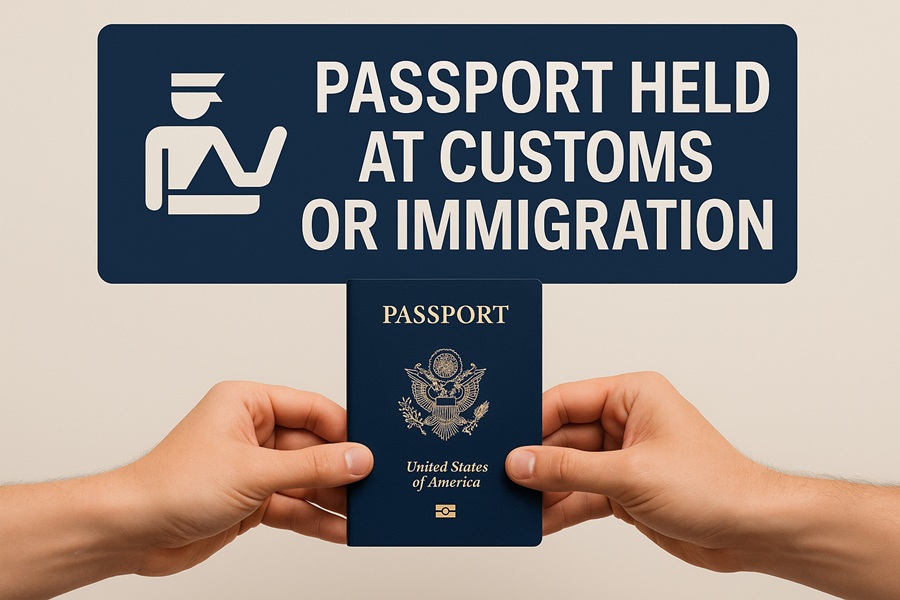Arriving in a foreign country (or returning to the United States) is stressful enough without unexpected surprises. One of the most unsettling experiences a traveler can face is having their passport held by customs or immigration officials. While rare, it can happen - and knowing what steps to take can make all the difference in resolving the situation quickly and safely.
Why Customs or Immigration Might Hold Your Passport
Customs and immigration agencies have the authority to temporarily retain passports for several reasons, including:
- Verification of Identity or Documentation – If your name, photo, or passport details don’t match travel records, officials may need to confirm authenticity.
- Visa or Entry Requirements – Missing, expired, or incorrect visas can lead to extra checks.
- Random Security Screening – Sometimes, your passport is held briefly during additional security or customs inspections.
- Legal or Administrative Flags – Outstanding legal issues, overstays on prior trips, or database mismatches can cause a temporary hold.
What to Do Immediately
- Stay Calm and Cooperative
Arguing or refusing to comply will only worsen the situation. Maintain a respectful, patient tone. - Ask Politely for the Reason
It's your right to know why your passport is being held. Take note of the explanation and any officer names or badge numbers. - Provide Supporting Documentation
Offer additional ID, proof of travel plans, or copies of visas if available. If you keep a digital copy of your passport in secure cloud storage, now is the time to use it. - Contact Your Embassy or Consulate (If Abroad)
If you feel the hold is prolonged or unclear, reach out to the nearest U.S. embassy or consulate for guidance. They can verify your identity and intervene if needed. - Avoid Leaving Without Your Passport
Never walk away without clear written documentation if your passport is retained. You’ll need an official receipt or case reference to reclaim it.
If Your Passport Is Confiscated
If the situation escalates beyond a brief hold - for example, if it's confiscated due to suspected fraud, legal issues, or a more serious investigation - immediately:
- Document Everything – Write down what was said, by whom, and when.
- Get Contact Information – Know which office or department is holding your passport.
- Request a Written Statement – This can help prove the status of your document if questioned later.
- Inform the U.S. Department of State – Call the Office of Overseas Citizens Services at +1-202-501-4444 (if outside the U.S.) or contact your embassy.
How to Prevent Passport Holds in the Future
- Check Entry Requirements in Advance – Know visa, vaccination, and customs regulations for your destination.
- Renew Early – Avoid traveling with a passport that’s within six months of its expiration date.
- Keep Backup Documents – Have copies of your passport, visas, and ID in both digital and paper form.
- Register with STEP – The U.S. Smart Traveler Enrollment Program can make it easier for embassies to assist you abroad.
Q&A: Passport Held at Customs or Immigration
Q: Can customs keep my passport indefinitely?
A: No. In most cases, passports are held only temporarily for verification. If there’s a serious legal or immigration matter, they must follow formal procedures and you should receive documentation.
Q: What should I do if they won’t tell me why they’re holding it?
A: Remain calm, but ask politely for the reason and request to speak with a supervisor. If abroad, contact the nearest U.S. embassy or consulate immediately.
Q: Can I still travel within the country if my passport is being held?
A: This depends on local laws and the reason for the hold. In some countries, you may be restricted from traveling domestically without it.
Q: Should I carry my passport at all times when traveling abroad?
A: In some countries, yes—local laws may require it. In others, carrying a photocopy is safer to avoid losing the original. Always check local regulations.
Q: Will this go on my record for future travel?
A: Not necessarily. If the hold was due to a minor verification issue, it likely won’t impact future travel. However, serious incidents may be logged in immigration databases.


